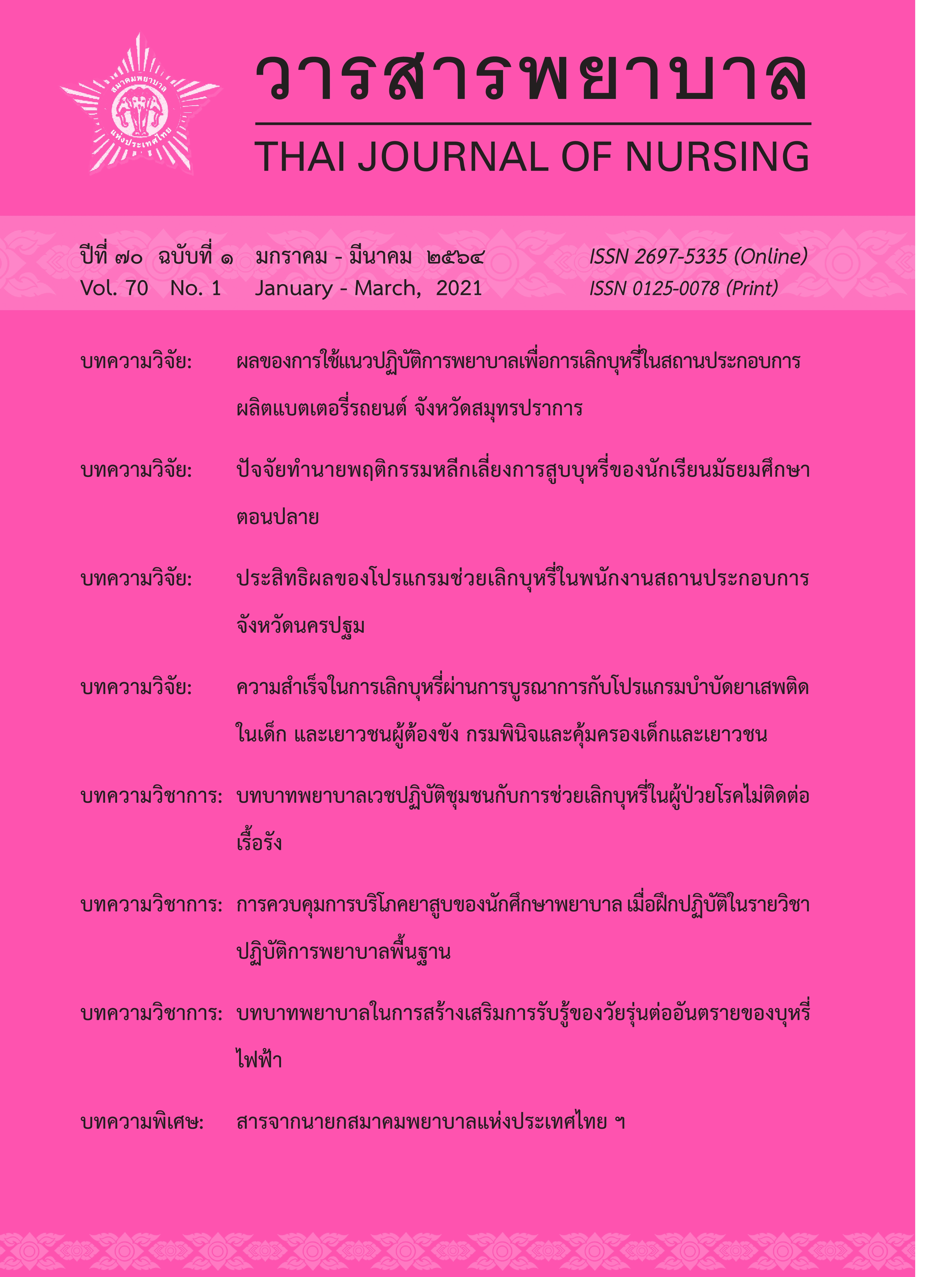Community nurse practitioner’s roles on smoking cessation assistance for patients with non-communicable disease
Main Article Content
Abstract
Smoking is a major risk factor for patients with non-communicable disease. Especially, patients with hypertension and diabetes mellitus whose could raise the severity of high blood pressure, high blood sugar level and could lead to disability and death. The objective of this article is to propose a quit smoking guideline for patients with non-communicable disease in primary care, secondary care and tertiary care regarding community nurse practitioner roles. This guideline application can reduce severity and complications of those non-communicable diseases. Then, a better quality of life among patients with non-communicable disease can be promoted.
Article Details
References
กรองจิต วาทีสาธกกิจ. (2552). ความสำคัญและความหมายของ “ถนนปชต” ต่อระบบบริการสุขภาพ.
กรุงเทพมหานคร: มูลนิธิรณรงค์เพื่อการไม่สูบบุหรี่.
ประกิต วาทีสาธกกิจ. (2560). ข้อมูลบุหรี่กับสุขภาพ (พิมพ์ครั้งที่ 6). กรุงเทพมหานคร: ฑีรกรานต์กราฟฟิค.
พิมพร จินดาคำ, กันยารัตน์ เจนป่า, วิสุทธิ์ กังวานตระกูล, จุฬารัตน์ ปริยชาติกุล, และลิ่มทอง พรหมดี.
(2561). ความชุกของการสูบบุหรี่ในผู้ป่วยโรคเบาหวานและความดันโลหิตสูงในประเทศไทยจาก
การตรวจหาโคตินีนในปัสสาวะด้วยชุดทดสอบ. วารสารเทคนิคการแพทย์และกายภาพบำบัด, 30(3),
-407.
วิชัย เอกพลากร. (บก.). (2559). รายงานการสำรวจสุขภาพประชาชนไทยโดยการตรวจร่างกาย ครั้งที่ 5
พ.ศ. 2557. นนทบุรี: เดอะกราฟิโก ซิสเต็มส์.
สภาการพยาบาล. (2552). ขอบเขตและสมรรถนะผู้ปฏิบัติการพยาบาลขั้นสูง สาขาต่าง ๆ. สืบค้นเมื่อ 20
ธันวาคม 2562, จาก https://www.tnmc.or.th/images/userfiles/files/H014.pdf
สุนิดา ปรีชาวงษ์, ฟอระดี นุชส่งสิน, และศิริวรรณ พิทยรังสฤษฏ์. (2558). การทบทวนวรรณกรรมเรื่อง
ประสิทธิผลของการให้บริการช่วยเลิกบุหรี่ในผู้ป่วยโรคเรื้อรัง. วารสารสาธารณสุขศาสตร์, 45 (3),
-328.
สุทัศน์ รุ่งเรืองหิรัญญา, และสุรจิต สุนทรธรรม. (2555). แนวทางเวชปฏิบัติอิงหลักฐาน การบำบัดโรคเสพ
ยาสูบในประเทศไทย. นครปฐม: สินทวีกิจ พริ้นติ้ง.
สุวรรณา จัทร์ประเสริฐ. (2557). พยาบาลเวชปฏิบัติชุมชนกับการดูแลสุขภาพระดับปฐมภูมิในประเทศ
ไทย. วารสารการปฏิบัติการพยาบาลและการผดุงครรภ์ไทย, 1(1), 57-65.
อรพินท์ ขันแข็ง, และสมสมัย รัตนกรีฑากุล. (2562). ปัจจัยที่มีความสัมพันธ์กับการเลิกสูบบุหรี่ในผู้ป่วย
โรคเรื้อรังชาย จังหวัดตราด. วารสารวิทยาลัยพยาบาลพระปกเกล้า จันทบุรี, 30(2), 160-172.
อรสา พันธ์ภักดี. (2559). แนวปฏิบัติการพยาบาลเพื่อช่วยเลิกบุหรี่: คู่มือการให้คำแนะนำการช่วยเลิกบุหรี่
งานประจำ (พิมพ์ครั้งที่ 1). ปทุมธานี: สื่อตะวัน.
อรสา พันธ์ภักดี. (2560). ถอดบทเรียนความสำเร็จ การพัฒนาสมรรถนะพยาบาลเพื่อช่วยเหลือผู้ป่วยโรคไม่
ติดต่อเรื้อรังเลิกเสพยาสูบ. ปทุมธานี: สื่อตะวัน.
Andrews, J. O., Tingen, M. S., & Harper, R. J. (1999). A model nurse practitioner-managed smoking
cessation clinic. Oncology Nursing Forum, 26(10), 1603-1610.
Christman, C., & Bingham, M. (1989). The nurse practitioners’ role in smoking cessation. Journal of
the American Academy of Nurse Practitioners, 1(2),49-54. doi: 10.1111/j.17457599.1989.
tb00739.x.
Heatherton, T. F., Kozlowski, L. T., Frecker, R. C., & Fagerström, K. O. (1991). The Fagerström
test for nicotine dependence: A revision of the Fagerström Tolerance Questionnaire. British
Journal of Addiction, 86, 1119-1127.
Prochaska, J. O., & Velicer, W. F. (1997). Transtheoretical model of behavioral change. American
Journal of Health Promotion, 12, 34-38.
World Health Organization [WHO]. (2018). Non-communicable disease. Retrieved December 20, 2019,
from https://www.who.int/nmh/publications/ncd-profiles-2018/en/


